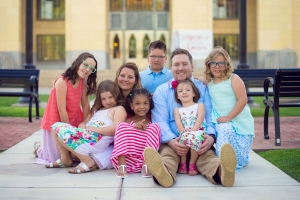Apathy is defined as having a lack of interest, enthusiasm, or concern. This is a word I have used in the past 4-7 years to describe my personal response to politics. It is also a word that stares back at me as I think about the most recent cuts that the Oklahoma Department of Human Services must face during this next fiscal year. Cuts that will affect the foster families I serve and fellow adoptive families across Oklahoma. Cuts that will also reduce meals for senior citizens, child care help for low-income individuals and in-home support for developmentally disabled children and adults.
As I read about the most recent cuts, I thought – I’m guilty. I’m guilty of not caring enough to truly get involved.
Are you guilty too?
The truth is, I’ve worn the apathetic term like a badge of honor over the past several years, claiming all politicians were corrupt and acting like I was above the fray by not engaging. In reality, my silence and lack of interest put us in this place today. Did my lack of engagement push it over the edge? No. In fact, I’ve only lived in Oklahoma for 2 years and I voted this past November for the first time since 2008. True confession, prior to the vote I didn’t do any research on candidates or issues. I literally went in blind and chose accordingly. I didn’t vote straight party either, instead I mixed it up for good effort. This past spring I helped pen a letter to legislators on the behalf of Oklahoma Care and other foster care agencies expressing honest concern that the budget cuts could affect foster and adoptive families if DHS was forced to make additional cuts. I’m certain I probably patted myself on the back for my efforts.
Here is the problem though, I do not think I am much different from the average Oklahoman or American. We are jaded, apathetic and disengaged. When something goes astray we scream and shout for a minute, then we go back to our daily lives and let the politicians and lobbyists go back to business as usual. We do not hold politicians accountable with our vote and engagement. Guess what? I’m certain politicians know this too. They know we will sleep before the next vote and move on with the busyness of life. They know we will believe the lie, “my vote doesn’t make much of a difference” and not take the time to show up to the polls. They know we will climb on our social media soap box, post and vent, then climb back off it and never back it up with a phone call, a petition, or even a visit to their office. Apathy breeds apathy and it is all around us folks.
It is time to wake up fellow Oklahoman’s.
To everyone in the apathetic club with yours truly, I think it is time to get into the game and get involved. It is time to stop wondering if our vote even matters and move forward with making it matter. It is time to make Oklahoma a great state through our involvement, concern, and action.
Do I think the government should be the stop-gap for all of society’s needs? No. I do think it can and should do more for the most vulnerable including children, senior adults and the truly disabled. Politics aside, this is our issue Oklahoma. These cuts, this budget, and this broken political system came on our watch. We can blame oil prices, crooked politicians, lobbyists or an assortment of other issues, but first, let’s each look in the mirror, own up to our apathy, and commit to be different.
It is our state, our vote, and our voice that needs to be heard.
Politicians have spoken.
Oklahoman’s it is our time to speak.
- Educate yourselves.
- Contact your representative.
- Get engaged.
- Educate others.
- Volunteer and donate to non-profits.
- Vote.

